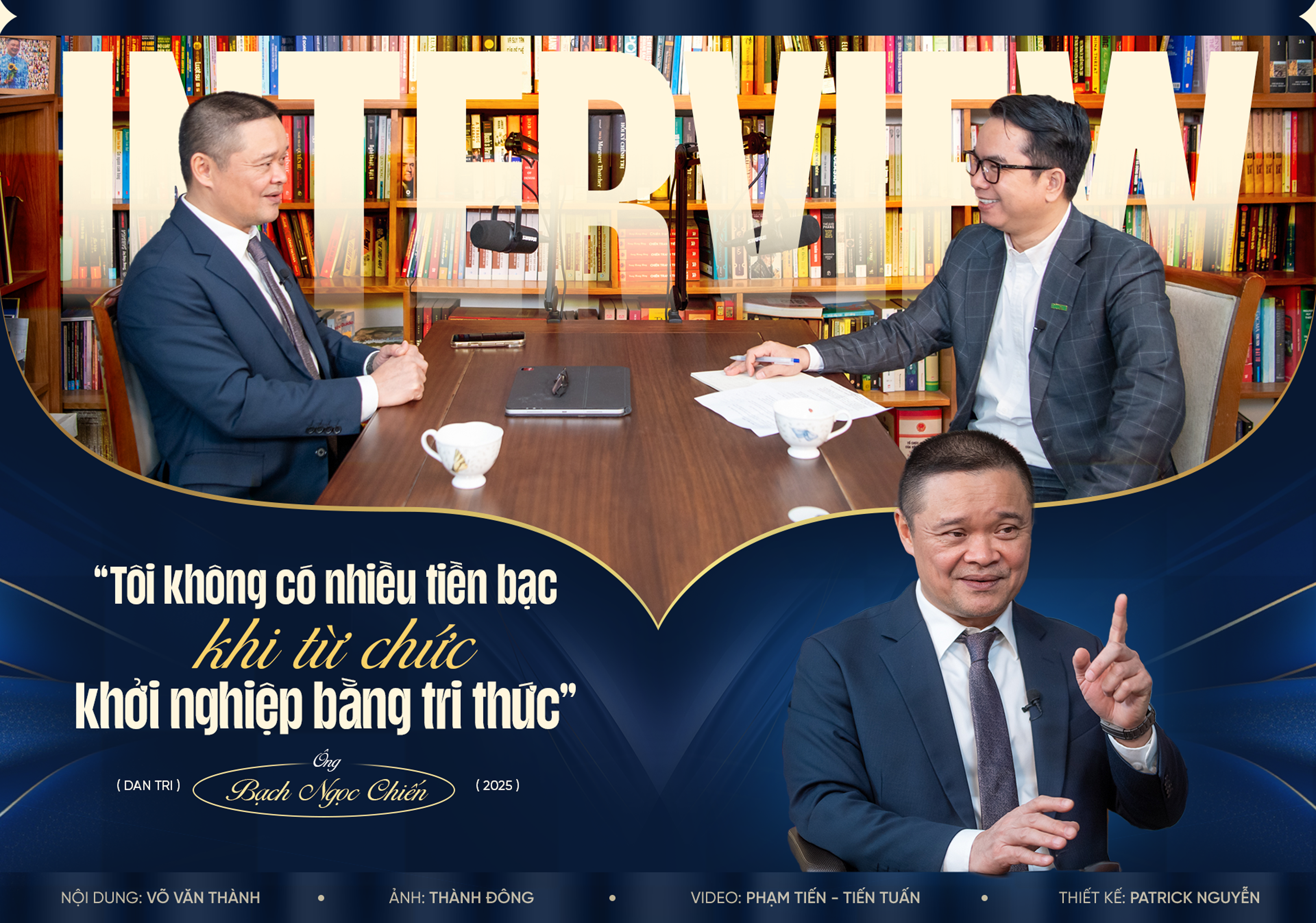
After resigning in 2020, Mr. Bach Ngoc Chien joined a private educational organization and is currently starting a business in the field of English and Vovinam (Vietnamese Martial Arts) training.
Dan Tri had an open and frank conversation with Mr. Bach Ngoc Chien.

After 4 years working for a private educational institution and starting a business, how does your income now compare to before?
- When I left the government, I had to think about finding a new job to support my life and save some for my old age. Although I had held several positions during my career, I was only a salaried employee so I had almost no significant financial or asset accumulation.

Initially, I planned to work for a foreign company, especially an American one. I used to hold the position of Press Attaché at the Vietnamese Embassy in the US, and I knew many friends and partners in the fields of education and Vietnam-US trade. The period when I left the public sector was also the time when a number of large American corporations began to consider opening offices in Vietnam. The salary for these companies was certainly very attractive, up to tens of thousands of dollars per month. At that time, I applied for a position as a representative of an American corporation.
However, a lawyer friend advised me that if I worked for a foreign company, I would only be able to develop one strength. On the contrary, if I worked for a domestic company, I could take advantage of many different strengths. That advice made me consider, and finally decided to choose to work for a Vietnamese educational organization to both maximize my personal capacity and create positive social impacts. The salary this company pays is 180 million VND/month, not including other benefits. In the past two years, I switched to starting a business with Vovinam Digital, at the startup company because there was no revenue, I only received 30% of the salary.
When he took the advice of his friend above, what did he decide was his greatest strength?
- I think my biggest advantage is English, and I have to develop it right away. Throughout my many years of work, I have used English regularly. More importantly, I believe that thanks to foreign languages, I have made a lot of progress in life. I want to help children have this useful tool too.
My family lives in a purely agricultural village near the center of Hanoi . This area has now become heavily urbanized. However, in the past, because it was a rural village, most of the young people grew up around ponds and rice fields.
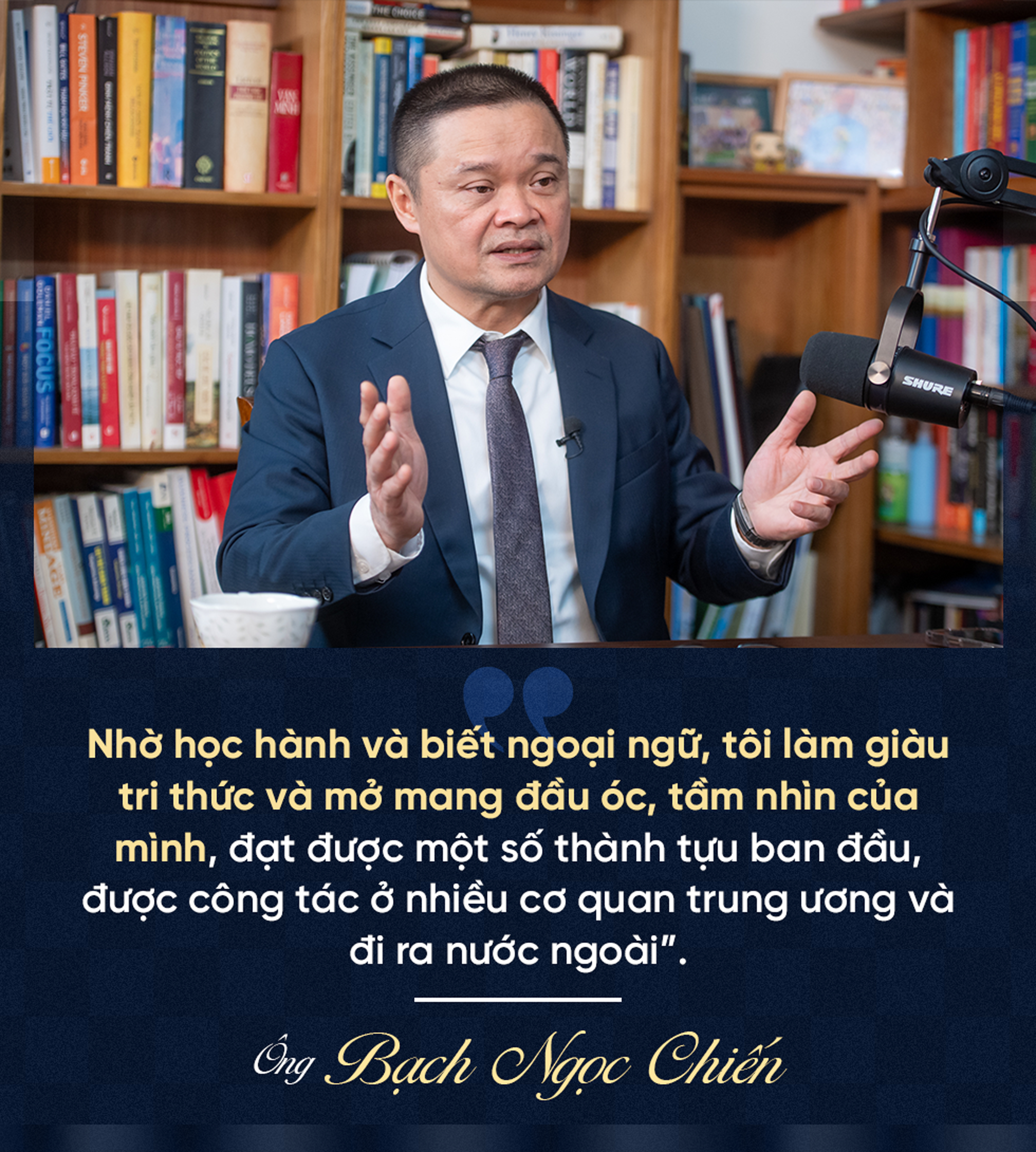
Thanks to studying and knowing foreign languages, I have enriched my knowledge and broadened my mind and vision, achieved some initial successes, worked in many central agencies and traveled abroad. Many of my friends are still attached to the village, but have higher incomes than me thanks to the increase in land prices in the village. However, they often say: "You may have less money, but you are more wealthy than us because you are educated." That statement motivates me to want to create opportunities for children, so that they can be both richer and more "noble" thanks to knowledge.
This is the reason why when I left my government job, I chose to join a private education group and contribute some initiatives, especially the English teaching model that combines in-person and online.
How do you define rich and how is noble?
- I believe that "luxury" lies in the wealth of knowledge. When I was young, I also craved attention and recognition, but I did not want to build confidence with only external things such as branded clothes and expensive cars. In my opinion, sustainable value comes from knowledge and intelligence, because luxury items eventually wear out, while knowledge can always be promoted, even becoming a legacy when we are no longer around.
In 1995, I worked as a tour guide with an average income of about 1,000 USD/month - equivalent to nearly 4 taels of gold at that time, while the salary of a civil servant was only about 25 USD. At one point, I was invited to work at a shipping company with an income of 3,000-4,000 USD/month, but after a few days, I realized that I was not suitable for a job that only focused on "bread and butter". Instead of making a lot of money early, I wanted to do something "bigger" and more meaningful for society.
So, in 1996, I decided to take the entrance exam to the Ministry of Foreign Affairs, accepting a civil servant salary of less than 30 USD/month. I also wanted to try my hand at diplomacy - a "holy land" that is usually considered to be reserved for those in the industry. Later, when I moved from the Ministry of Foreign Affairs to Vietnam Television, I continued to set the goal of spreading useful and positive information to as many people as possible.
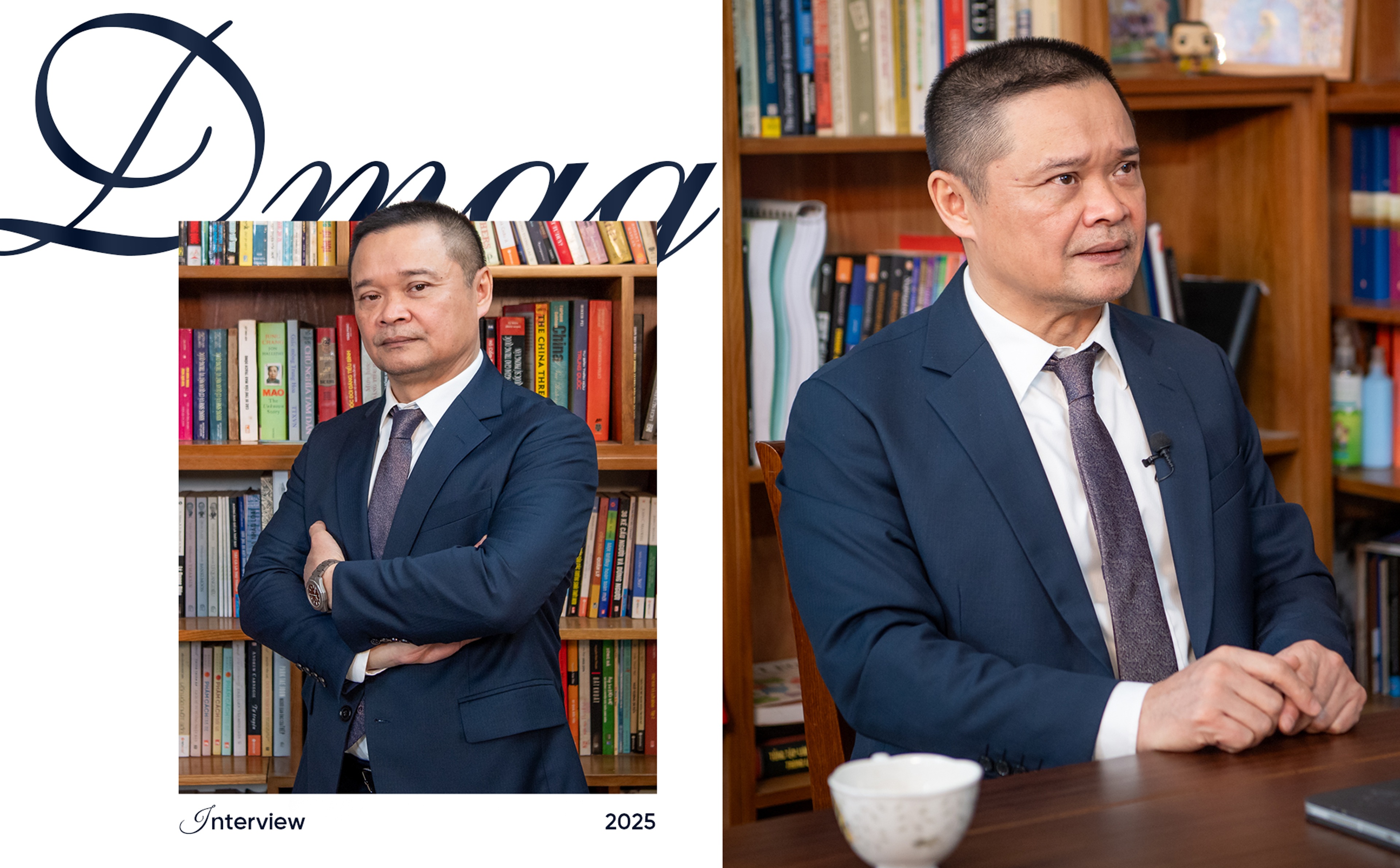
Finally, I realized the natural law: when you create good value for society, you will certainly be rewarded accordingly. I am satisfied with the path I have chosen and believe that the greatest "blessing" is intelligence. Currently, I am not rich, but I am not poor either. What is important is that I think I live a decent life. By pursuing knowledge and meaningful work, I still have a full life, and the joy of knowing that I am contributing to the community.
Perhaps the idea of "nobility" as being rich in knowledge and contributing to society has shaped your life to some extent. Was there a time when you thought that it would have been better if you had chosen a different path, such as accumulating more assets?
- I never regretted missing out on an opportunity to make more money. I never told myself that if only I had stayed with this company or that company, I would be a millionaire or a billionaire now.
Actually, my opportunities to earn money have become bigger and bigger over time. 30 years ago, a salary of 3-4 thousand dollars/month was really big, but my opportunities have become even bigger. There was even a period when my father-in-law was a Politburo member and Secretary of the Hanoi Party Committee. If I had taken advantage of that "borrowed" advantage, I might have had some opportunities to earn money. But I chose to create my own advantages without taking advantage of borrowed advantages.
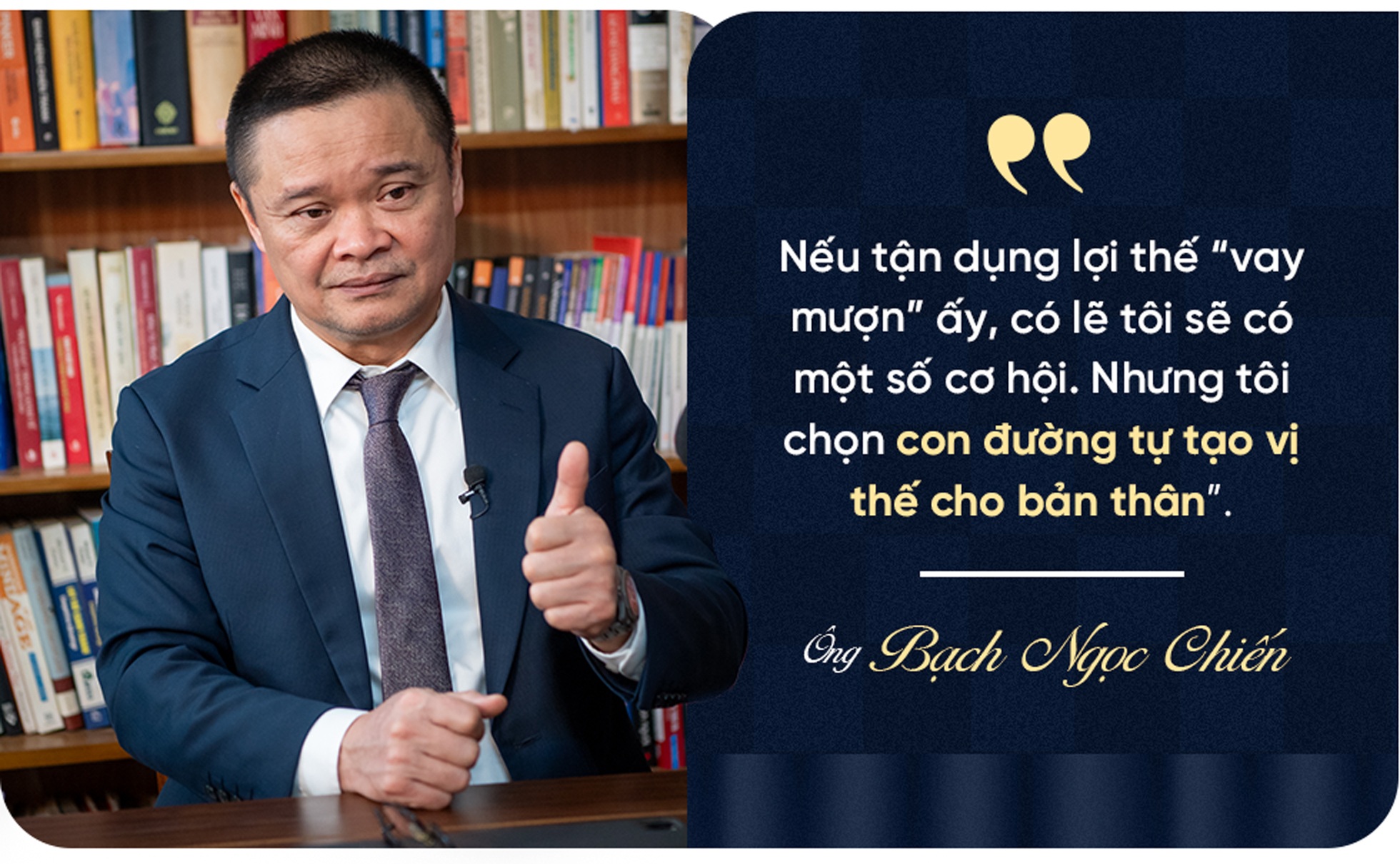
While I was trusted at the Ministry of Foreign Affairs, I decided to move to Vietnam Television. Both sides of my family objected, because everyone thought I was "climbing a tree and about to reap the rewards", why should I give up? However, my thinking was that I needed to explore new fields, accumulate more knowledge and experience. That's why I decided to move from a favorable job to a completely new and challenging job. Facing and overcoming difficulties helps me become more confident instead of clinging to what is available.

Back to your startup story, the reason you chose English is clear because it is your strength, but why Vovinam?
- I have had a relationship with Vovinam since 2007, when I joined the Steering Committee to establish the Vovinam Federation of Hanoi City. Now, after many years of association, I have decided to devote all my time to contributing to creating substantial changes for the sect.
Vovinam was founded by Master Nguyen Loc in 1938, when he was only 26 years old. What is special is that from the beginning, he named the school "Vovinam" - short for "Vietnamese Martial Arts" - expressing his aspiration to reach the world and his wish that this would be a martial art with Vietnamese identity. His successors have developed Vovinam into a "mind-body revolution", training both physical and mental strength to make people strong, powerful, protecting justice, fighting against tyranny; from there forming the concept of "Nhan Vo Dao" - a philosophy of life not only for Vietnamese people.
From its starting point in Hanoi, Vovinam spread throughout the country, then continued to expand to the world after 1975. Up to now, the sect has been present in 73 countries and territories, with an estimated 2 million practitioners. Vovinam is also the martial art - sport of Vietnam with the largest global scale, with a tight organizational system: Vovinam Federations of provinces and cities in the country, Vovinam Federation of Vietnam, Vovinam World Federation and continental Federations. Currently, there are 53 national Federations that are official members.
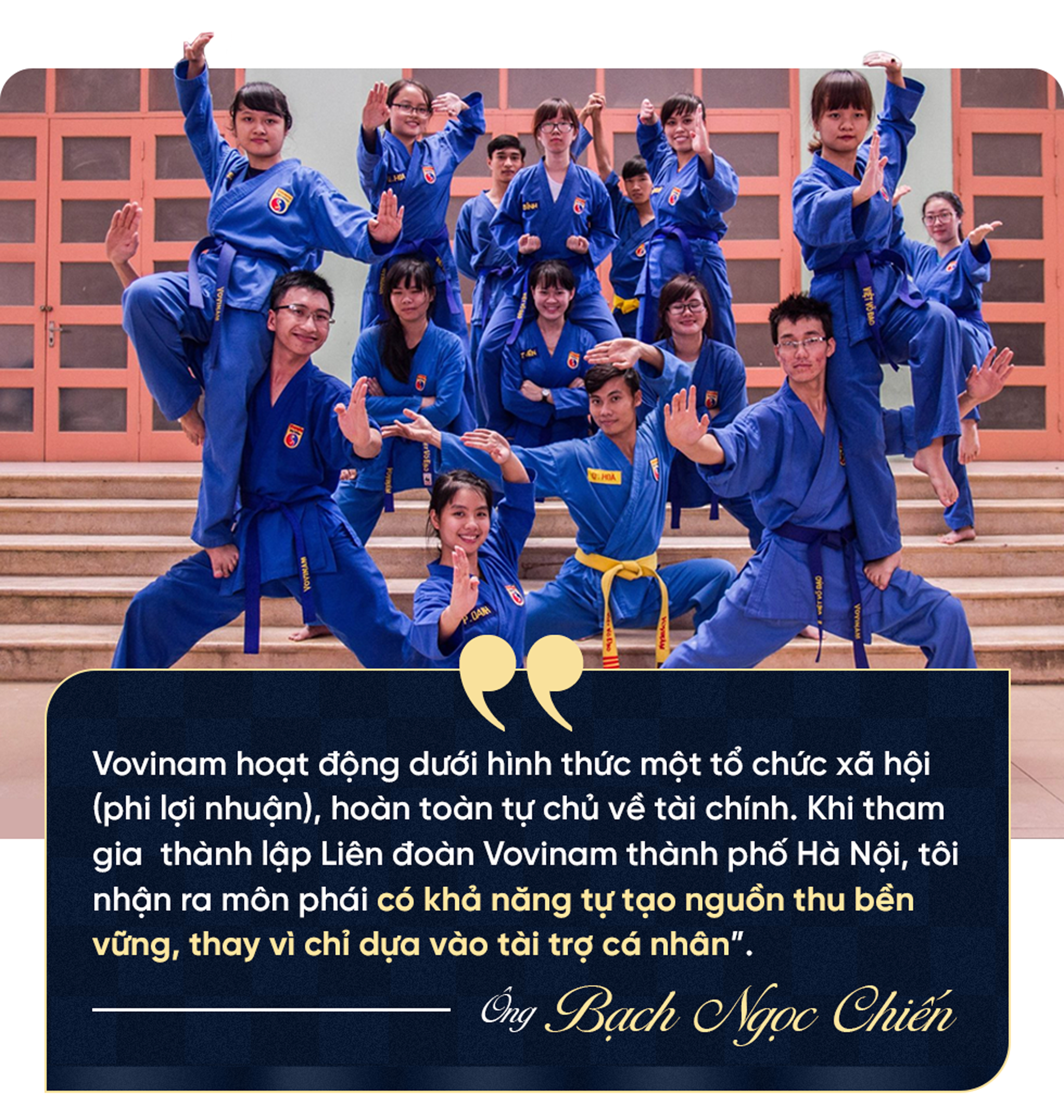
Notably, Vovinam operates as a social organization (non-profit), completely financially autonomous. When I participated in the establishment of the Hanoi Vovinam Federation, I realized that the sect has the ability to create a sustainable source of income, instead of relying solely on personal sponsorship. I presented the business plan to Mr. Mai Huu Tin - President of the Vietnam Vovinam Federation and received his strong support.
Mr. Tin has pledged to give part of his assets to Vovinam, but he agrees with me that the sect needs stable and long-term social resources to develop.
Our goal is to maintain the traditional core, while at the same time elevating Vovinam to a global martial art that can be present in the Olympic arena. Through this, Vovinam not only brings physical and mental benefits, but also strongly promotes Vietnamese identity to the world.
You have worked in various jobs from the government to the private sector and now you are an entrepreneur. With all your experiences, do you find starting a business in Vietnam easy or difficult compared to the jobs you have worked in the past?
- Starting a business is never easy. Before, I made very strong and decisive decisions in my work, but that was when I used other people's money. Now, everything has to be spent from my own pocket and the shareholders', so the responsibility is much higher. For example, in the second year of starting a business, we are still "burning money" according to the general rules of technology startups.
Before the last Tet, I had to rush to pay salaries and bonuses to my colleagues. It was then that I realized the difficulty of doing business with my own money.
Regarding administrative procedures, I personally have not encountered any major problems. However, startups in Vietnam often face common difficulties in the business environment and market. Firstly, although Vietnam has a large population, the market is difficult to access because of fierce competition from imported goods, especially Chinese goods. Not only physical products but also intellectual products in the education sector - from software to programs and digital learning materials - are often overwhelmed by foreign goods.
Currently, educational products from China and Singapore are flooding into Vietnam at low prices, making it difficult for domestic companies to compete and easily becoming dependent "processors". My company is moving towards "self-reliance" and developing its own technology solutions and products, but I understand that starting a business in Vietnam, no matter what industry, is not simple.
Even the field that is considered my strength, such as Vovinam, still faces challenges. Changing the customs, habits and way of thinking of consumers is difficult, but changing the thinking of my own team and colleagues to accept the new is even more difficult.
Which environment do you feel you are more suitable for, an office or a startup?
- I am suitable for the people's environment (laughs). Actually, I think we should not think that we are only suitable for this environment, not suitable for that environment, but the most important thing is that we have the ability to adapt. Today we are still working, but tomorrow the system is streamlined, we can lose our job. The problem is not where we are suitable, but whether we can adapt or not.
In fact, in the US, I have seen many people who were directors the day before, flying private planes, and the next day standing on the street begging for help because they were fired. That change will certainly happen in Vietnam as well. Therefore, when I was working in the government, I always reminded my colleagues (and myself) to think of backup plans and find ways to prepare the necessary skills. If tomorrow we are no longer civil servants, we can still make a living. I myself used to joke that if I went out to pump tires or apply mortar, I would do well, because I was always ready to learn and adapt.
In life, there are very fierce twists and turns, especially in the political environment, everything can change overnight. Preparing a backup plan here is not about running around, but equipping yourself with hard skills, soft skills, and professional knowledge - things that help you live well in any situation.
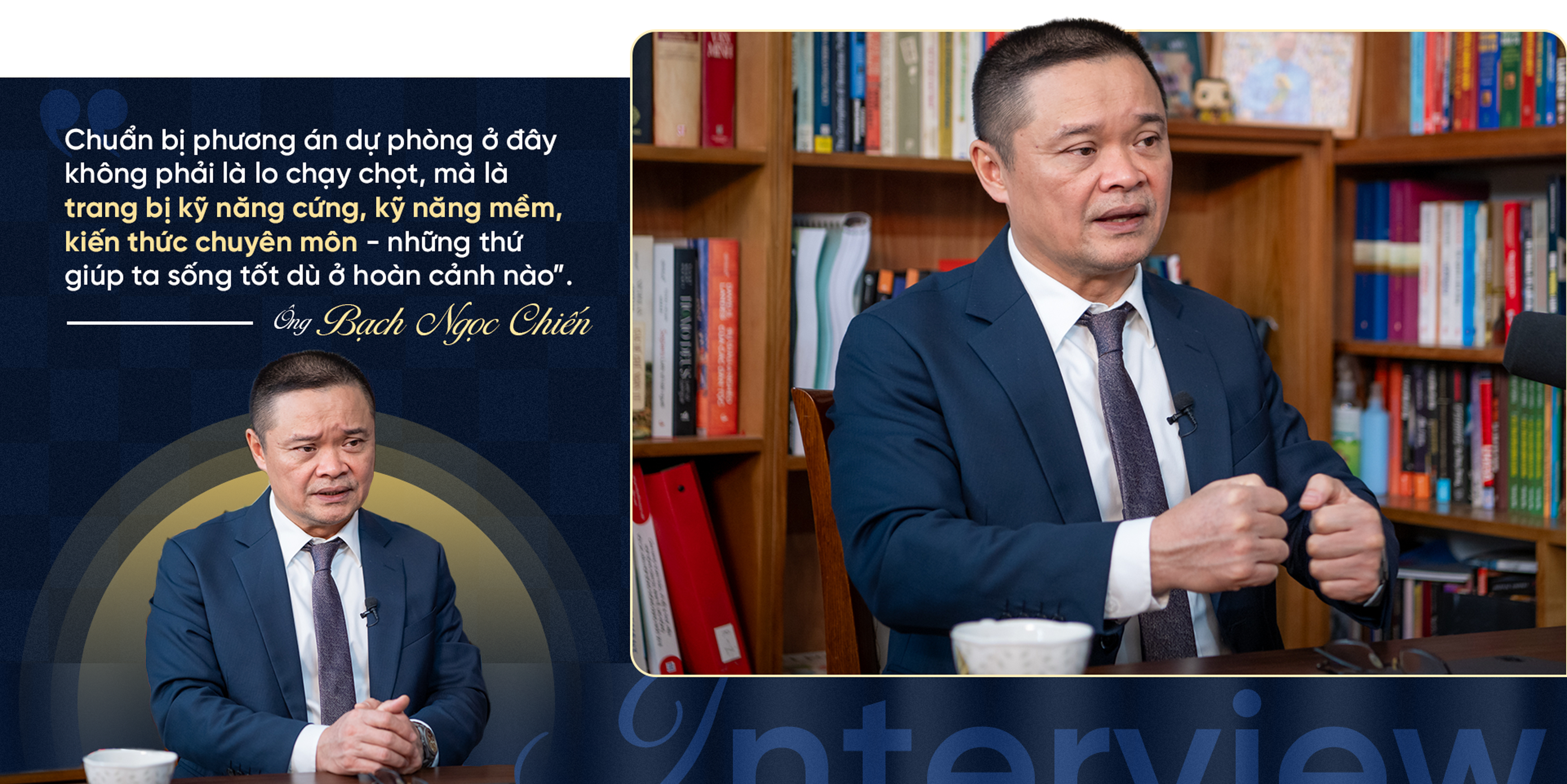

You just mentioned the word "adaptation", that is from the perspective of each individual. Looking at the overall labor market, in many countries, "in, out, up, down" is very flexible, for example, a person who is a minister today can be a university professor, CEO of a private corporation tomorrow and vice versa. But in our country, it is not so easy, especially for a person in the private sector, it is often very difficult to "interrupt" to participate in state management. What do you think?
- We are part of the world, inseparable from global laws. In fact, many things in Vietnam that were previously thought impossible have now become normal thanks to the integration process. For example, 20 years ago, I used to wish in the US that Vietnam would have a modern highway system, that credit cards would be used... And now, all of them have appeared.
Adopting good international practices is beneficial for the country. Recent reforms in streamlining the apparatus, cutting public spending, etc. are in line with the general trend. The story of a person working in the state apparatus today, moving to the private sector tomorrow, and then returning to political activities the day after tomorrow is also normal and will happen in Vietnam - because that is the general rule.
In fact, during feudal times, it was not uncommon for high-ranking officials to resign and return to their hometowns to teach, only to be invited back to the royal court by the next king.
Looking around the world, we also see former prime ministers or ministers willing to return to politics in other roles. This is a natural trend, promoting development at the individual, organizational, national and ethnic levels. Only by accepting and applying good practices can we go further.
How about you personally, for example, if there was an opportunity for you to re-enter the public sector now, would you be willing?
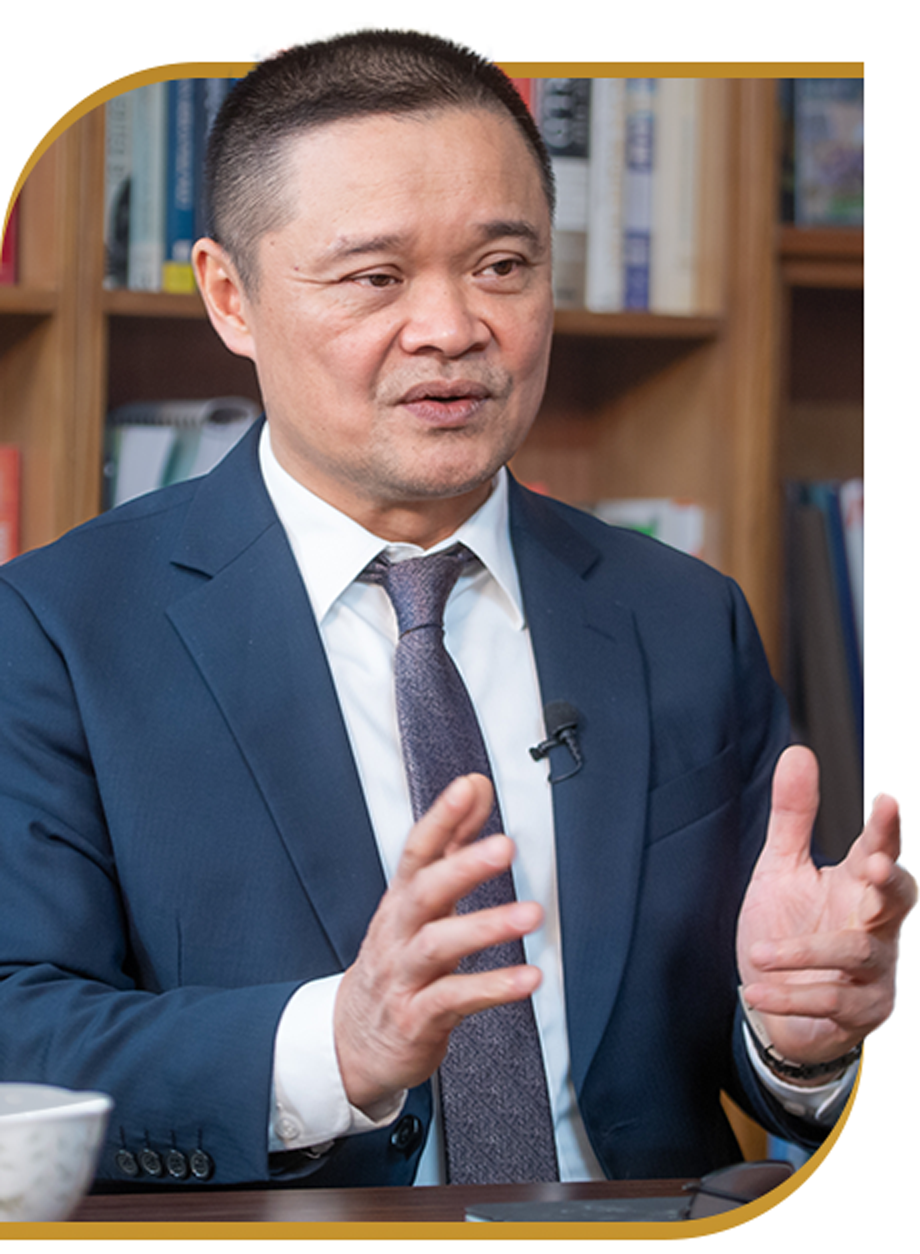
- "Fitness" is an extremely important factor when participating in politics. People often talk about "he is like this or like that but he was appointed to a high position", but in the end, politics requires suitability more than just talent or knowledge.
I myself realized that I was not suitable for a certain time and context, so I decided to withdraw. No matter how outstanding someone is, they must follow the rule: life is short, so it is best to focus on doing meaningful work and bringing positive influence to society in the field that you find suitable.
That is my principle in life. I only do what helps me contribute to the community, and if it is just to satisfy fame or material things, I do not care. Because at this age, I am no longer interested in vain illusions.
So the reason you resigned and left the public sector was because you felt you were not suitable for the specific context at that time?
- I still clearly remember February 27, 2020, when I was Vice President and General Secretary of the Vietnam Union of Friendship Organizations, I submitted a "resignation and termination letter" to the competent authorities for consideration. I felt that my ability to meet and adapt to the requirements of a higher level of work had reached its limit and I also saw no prospect of further development. This decision was carefully considered after I learned that I was not on the list of nominees for the 12th Central Committee (2016-2021). I understood that I did not meet the conditions and qualities to be selected by the organization and I did not want to "lobby" to be selected.
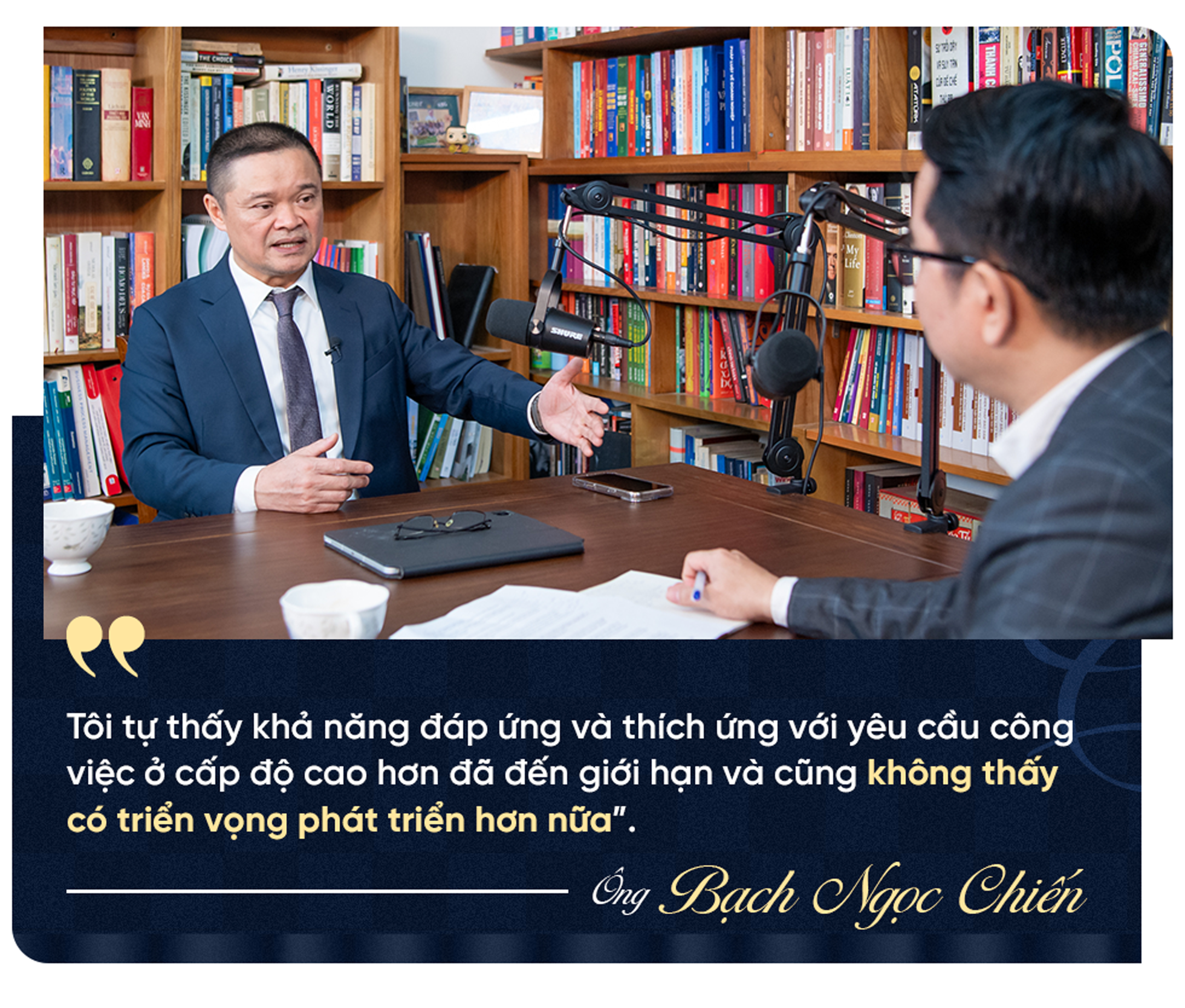
Previously, after being transferred and holding the position of Vice Chairman of the People's Committee of Nam Dinh province from July 2019 to June 2020, I was informed that I would return to Hanoi to hold a leadership position, but the work arrangement was inconsistent. However, I still accepted because I did not want to affect the cadre planning in Nam Dinh, and above all, I still saw many opportunities for "people's diplomacy" in the Vietnam Union of Friendship Organizations. However, when I presented my idea to my superiors, I did not receive support. That was the last straw that made me make a decisive decision.
Actually, I am not pessimistic. Life is limited, so there is no need to waste time on things that bring stress and do not solve anything. I choose to live happily, spending time on things that can create better value and meaning.
Honestly, did you feel disappointed at first after resigning?
- I was sad, sad for several years, but I have no regrets. Imagine: I sacrificed many great income opportunities to join the public sector. Before joining the Ministry of Foreign Affairs (in 1996), my income was about 11 million VND/month, equivalent to 4 taels of gold at that time. When I retired from the state job, my salary was less than 11 million VND, not enough to buy 2 taels of gold. So clearly I did not choose this path for money, but because I wanted to contribute. I think, if the desire to commit and contribute is not appreciated, we have the right to leave. There is nothing wrong with that.

With the current revolution of streamlining the apparatus, it is expected that hundreds of thousands of cadres, civil servants and public employees will be affected after many years of working for the state. How do you view this?
- As a citizen and businessman, I strongly support this streamlining of the apparatus. Local management experience shows that merging some agencies such as Planning and Finance helps reduce procedures, saving a lot of time and resources for businesses.
A cumbersome apparatus often generates countless procedures to maintain its reason for existence; therefore, cutting unnecessary steps is the right thing to do, not only because it reduces 100,000 staff, but more importantly, it significantly reduces the procedural burden on people and businesses, helping to increase the efficiency of the apparatus's operations.
Streamlining the apparatus, however painful, is better than perpetuating inefficiency and leaving future generations with debt. Life is fair: if we leave a good legacy, our descendants will be grateful; conversely, if we leave a burden, they have the right to blame us for being irresponsible.
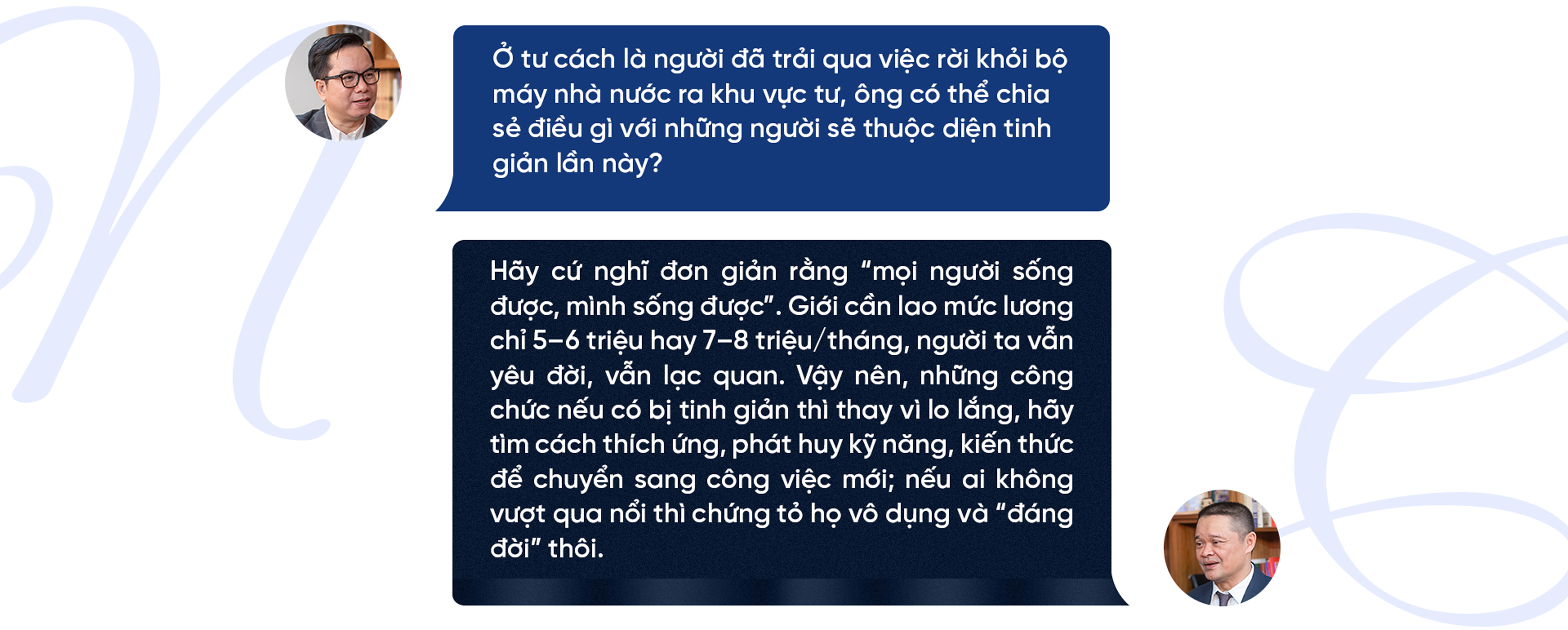
Many opinions say that in the current period, the state's regulatory "hand" is needed to make the labor market operate smoothly, making the most of human resources from the public to the private sector. From a policy perspective, what do you think should be done?
- General Secretary To Lam said a very good idea, I would like to quote:
"We have talked a lot about preparing "nests" for "eagles", this is very true, very much worth doing. But why do we rarely mention plans to prepare "forests" and "fields" for "bee colonies" to collect flowers to make honey?
Why haven't we set targets for creating new jobs for each period and each sector? In the coming period, about 100,000 workers will leave the state sector due to the impact of streamlining the political system and 100,000 young people will return to their localities after completing their military service. So what policies does the Government have so that the non-state sector can receive some of them? What policies are there to develop the labor market and the job market?
From the above statement of the General Secretary, we can see that we should look at the problem more broadly than just focusing on "caring" for the 100,000 affected workers.
Streamlining the apparatus in general, and streamlining 100,000 staff in particular, will help create a more favorable business environment, reduce administrative procedures, thereby stimulating business development and creating more jobs for society.
As the business environment improves, the benefits will not only be felt by the 100,000 people who are laid off, but by the millions of new people entering the labor market every year.
The core of creating an "inclusive institution" (according to economist Acemoglu) is to build a legal corridor and policies to encourage innovation and fair competition. Currently, many signs show that we are gradually moving towards creating an inclusive institution, thereby opening up many opportunities for people and businesses.
Hopefully these innovations, including streamlining the apparatus, will soon be effective, contributing to sustainable socio-economic development.
Thank you very much!
Content: Vo Van Thanh
Photo: Thanh Dong
Video: Pham Tien, Tien Tuan
Design: Patrick Nguyen
Dantri.com.vn



![[Photo] General Secretary To Lam chairs the meeting of the Central Steering Committee on preventing and combating corruption, waste and negativity](https://vphoto.vietnam.vn/thumb/1200x675/vietnam/resource/IMAGE/2025/9/29/fb2a8712315d4213a16322588c57b975)
![[Photo] Many streets in Hanoi were flooded due to the effects of storm Bualoi](https://vphoto.vietnam.vn/thumb/1200x675/vietnam/resource/IMAGE/2025/9/29/18b658aa0fa2495c927ade4bbe0096df)
![[Photo] National Assembly Chairman Tran Thanh Man chairs the 8th Conference of full-time National Assembly deputies](https://vphoto.vietnam.vn/thumb/1200x675/vietnam/resource/IMAGE/2025/9/29/2c21459bc38d44ffaacd679ab9a0477c)
![[Photo] General Secretary To Lam receives US Ambassador to Vietnam Marc Knapper](https://vphoto.vietnam.vn/thumb/1200x675/vietnam/resource/IMAGE/2025/9/29/c8fd0761aa184da7814aee57d87c49b3)
![[Photo] General Secretary To Lam attends the ceremony to celebrate the 80th anniversary of the post and telecommunications sector and the 66th anniversary of the science and technology sector.](https://vphoto.vietnam.vn/thumb/1200x675/vietnam/resource/IMAGE/2025/9/29/8e86b39b8fe44121a2b14a031f4cef46)


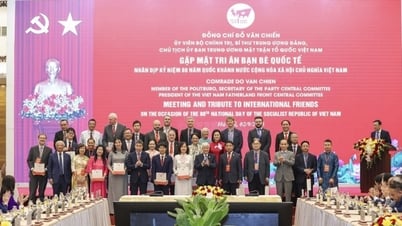
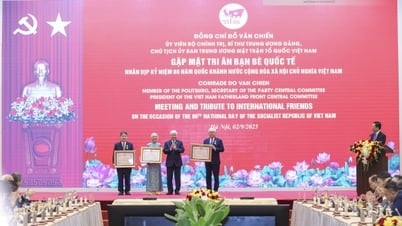

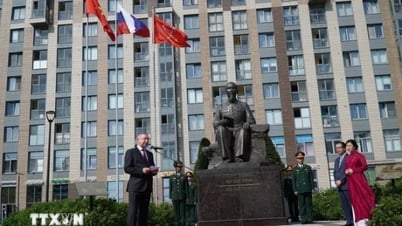
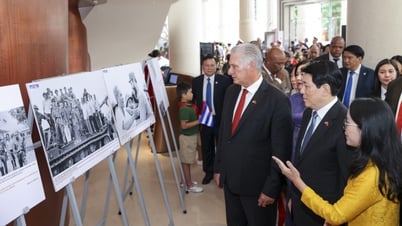
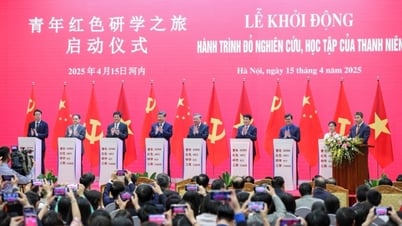
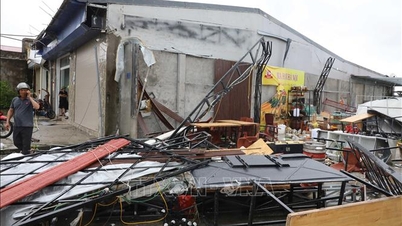

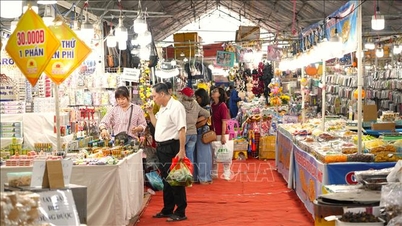


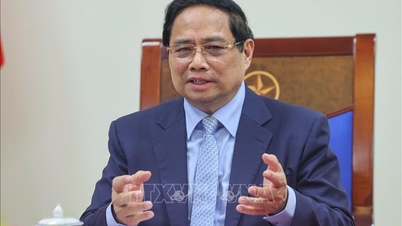
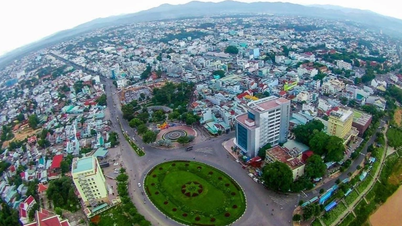
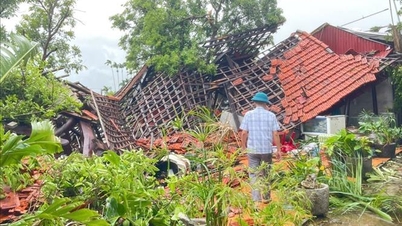





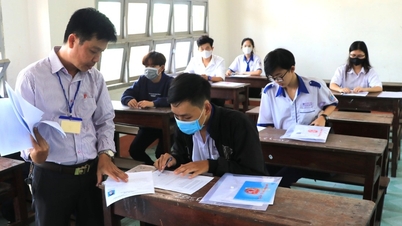

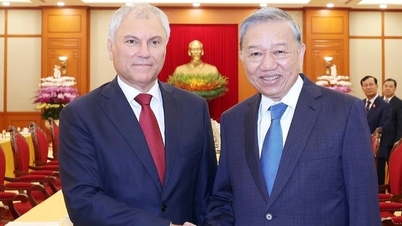



















































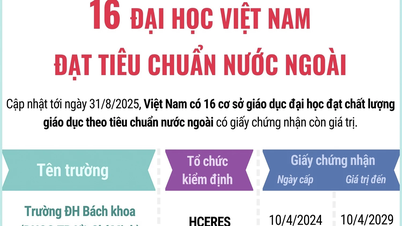






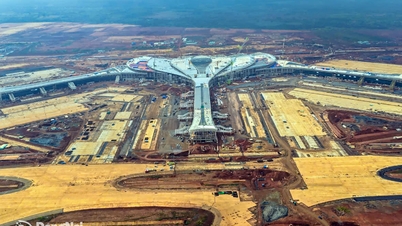














Comment (0)